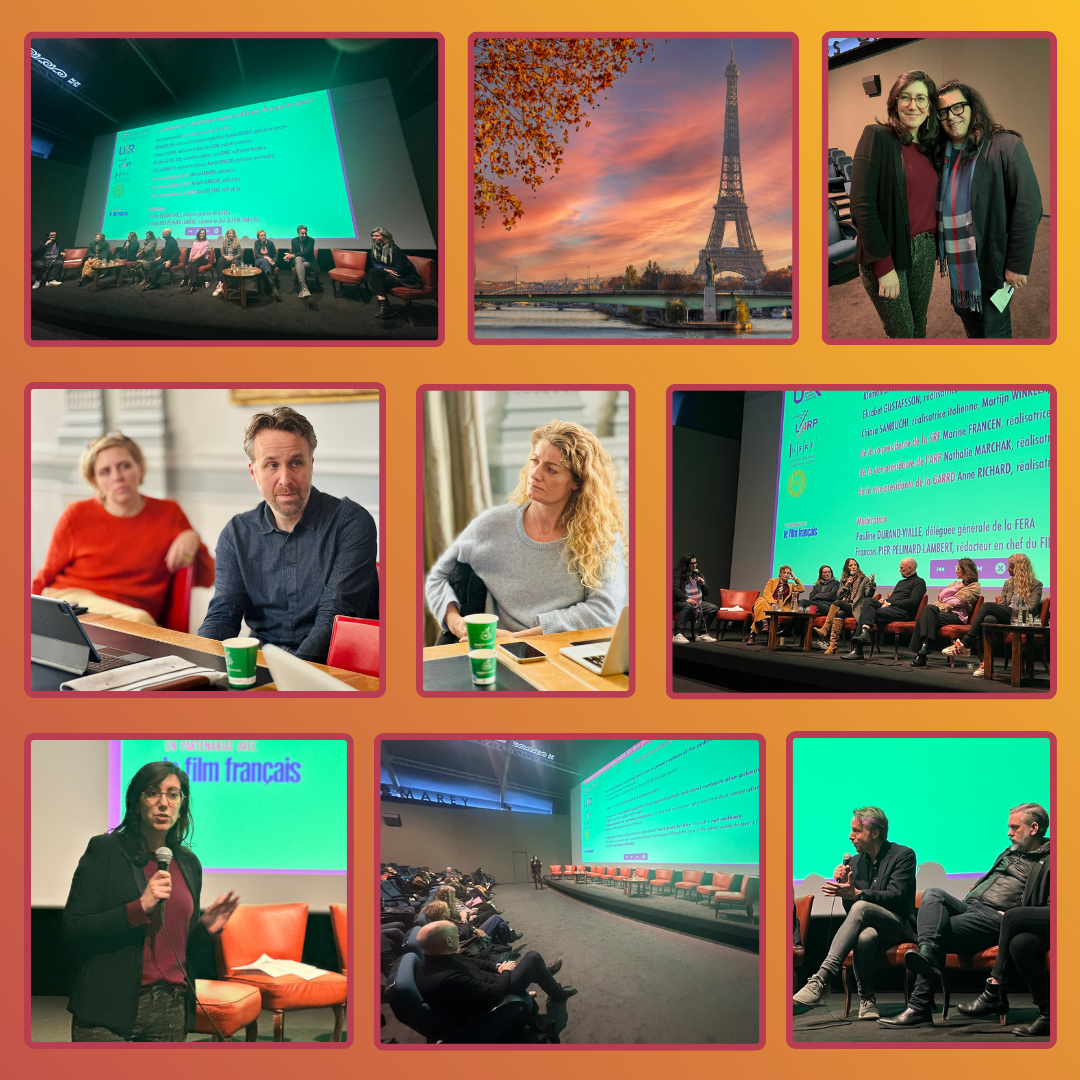
French and European Filmmakers meet in Paris to discuss artistic freedom in the digital era

From 6 to 8 December 2023, FERA held its Executive Committee meeting in Paris and met with FERA French members La SRF (Société des réalisatrices et réalisateurs de films), U2R (Union des réalisatrices & réalisateurs) and La GARRD (Guilde des auteurs-réalisateurs de reportages & de documentaires).
During their stay in Paris, FERA Board Members joined a roundtable discussion on the topic “Are European Directors Freer Than Others?”, which FERA co-hosted with their French member U2R. The event, which unspooled in the Cinéma des Cinéastes, was organised with the support of Les Cinéastes de L’ARP, La SRF (Société des réalisatrices et réalisateurs de films), La GARRD (Guilde des auteurs-réalisateurs de reportages & de documentaires). François Pier Pélinard-Lambert, the editor-in-chief of Le Film Français, moderated the roundtable discussion.
Speakers included Marine Francen (director and SRF co-chair), Nathalie Marchak (director and ARP vice-president), Anne Richard (director and Garrd vice-president), as well as seven FERA board members and Screen Directors: Chairman Bill Anderson (UK), Klemen Dvornik (SI), Ida Grøn (DK), Elisabet Gustafsson (SE), Lou Jeunet (FR), Chiara Sambuchi (IT/DE) and Martijn Winkler (NL).
Before the actual panel discussion, FERA CEO Pauline Durand-Vialle gave an introduction which highlighted the topicality of the event: Screen Directors contribute significantly to Europe’s cultural landscape, with 1.960 feature films being made in 2022, as well as 23.000 episodes of TV and SVOD fiction.
Despite their huge contribution to culture (and thus, to the economy) and their wide-reaching professional responsibilities before, during and after a project is being filmed, many Screen Directors struggle to make a living, from a 12 500 EUR median yearly income after tax as a Screen Director for female film- and TV-helmers in Europe, to 18 000 EUR for their male colleagues.
In the first part of the discussion, speakers delved into Screen Directors’ role, rights and craft in the 21st century. FERA Chairman Bill Anderson highlighted the dangers of a reductive idea of the director’s role spreading in the European industry, merely considering them as shot-gathers with no authorial vision. Which does not do their actual work any justice, insisted to Bill Anderson.
Anne Richard pointed out the challenging situation of documentary filmmakers in France, who have seen a 30 percent drop in income in the past 20 years. And this, despite the popularity of documentaries. As Nathalie Marchak pointed out, the reality of life as a Screen Director collides with the preconceived ideas of the public of the luxurious lifestyle of directors as film auteur with no financial constraints. Klemen Dvornik explained that, in Slovenia, less investment in audiovisual production means that directors actually have assume a wide range of roles on a production and more say during the development of an audiovisual project – but also less freedom when it comes to the choice of genre. Expensive productions, such as costume fiction, are almost impossible to finance in Slovenia.
One issue, all speakers agreed on, is the involvement of directors in the editing process. Especially in countries such as Germany, where audiovisual production is often only possible with funding from public broadcasters ARD and ZDF, for a 100-minute feature, directors often only get to spend a handful of days in the editing room. Final cut is far from a matter of course for directors across Europe today.
The second part of the panel focused on how to meet the various challenges Screen Directors face today. Nathalie Marchak underlined the essential importance of the rise of AI, as a technology which is today trained on human-made works, but a few years down the line would likely be fed by AI generated content. While the technology can also be a useful tool, e. g. for creating special effects, this would, according to Bill Anderson, endanger the “emotional and spiritual connection between a director and their audience”, who will be able “to smell the difference” between AI- and human-made stories.
Marine Francen talked about The Declaration of Filmmakers (Déclaration des Cinéastes), a call launched by French cinematographers in May 2023 at Cannes Film Festival highlighting the crucial role of the auteur in the development of creative works, as well as the importance of the right of authorship, a fair distribution of earnings & the regulation of artificial intelligence.
Several follow-up events have been held at Venice and San Sebastián Film Festivals as well as in Athens, and the movement grew to involve the following organisations: La SRF (Société des réalisatrices et réalisateurs de films), L’ARP (Société civile des Auteurs Réalisateurs Producteurs), ANAC (Associazione azionale Autori Cinematografici), 100autori, WGI (Writers Guild Italia), ACCIÓN (Asociación de Directores y Directoras de cine de España), the Directors Guild of Cyprus, Athens Film Office, EKOME – National Centre of Audiovisual Media and Communication), Greek Film Centre (GFC), Film in Cyprus and Ray Talent Agency.
Danish director Ida Grøn emphasised the need for more data to measure the effect of film not only on the economy but also on society as a whole, as this would better reflect the true extent of a Director’s responsibilities. In Denmark, the Netherlands and Sweden, first steps in the right direction have been made thanks to awareness raising campaigns about the work of Screen Directors.
Martijn Winkler highlighted that, thanks to such initiatives, change is possible: In the Netherlands an awareness-raising campaign resulted in a 25 percent pay increase for Screen Directors.
The roundtable discussion recording, and introductory presentations are available here:

